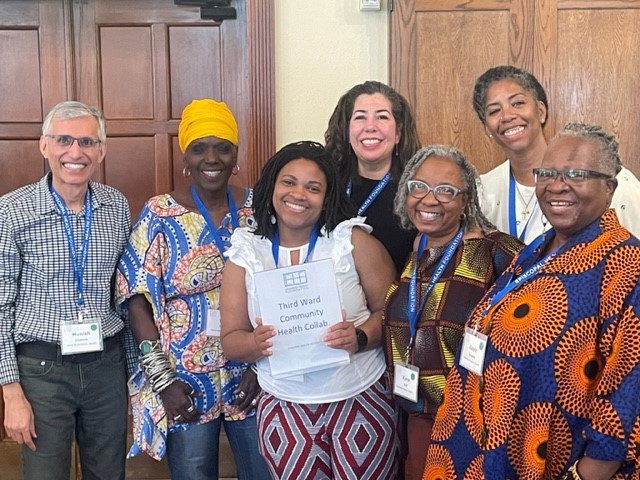When community partners unite, great things can happen. But when individuals and organizations work together efficiently, the possibilities are limitless.
The University of Houston contributes to a number of civic partnerships. Now, UH has a presence within the Third Ward Community Health Collaborative (TWCHC) among founding partner institutions—including the Third Ward Community Cloth Cooperative (serving as the initiative’s fiscal agent) — to address the health challenges faced by Houstonians within this historic neighborhood.
UH representatives, including faculty, staff and students from the Tilman J. Fertitta Family College of Medicine, also are exploring strategies and tactics to ensure that partners have an equal voice and work together seamlessly.
January marked the one-year anniversary of the Third Ward Community Health Collaborative. In 2023, several Third Ward coalitions came together to form a larger collaborative for more targeted and effective health outcomes.
“Usually, organizations are accustomed to making decisions and running their own projects. This often leads to a duplication of efforts when partnering with each other. In our new, more collaborative way of doing things, we are using a shared governance and consensus decision-making model. All partners are accountable for their work,” said Linda Civallero, director of community outreach for the Tilman J. Fertitta Family College of Medicine. “It’s important that everyone has an equal voice in this effort.”
Recently, the Collaborative received Collaborating for Healthy Communities Initiative and Activating Communities grants from the Episcopal Health Foundation. These grants total $10,000 and $300,000 respectively and are focused on the following goals:
- transforming the collaborative into a more effective organization
- building capacity of nonprofit organizations
- prioritizing and addressing community health priorities.
As a partner in the Collaborative, UH and college representatives are supporting functions such as communications and meeting organization. Future roles include health project implementation and evaluation.
The grants also support networking and capacity-building training and a year of collaborative leadership coaching sessions. The Assessment for Advancing Community Transformation is used as a guide for growth and transformation in collaboration, communication, advancing equity, planning for action, evaluation and sustainability.
According to Civallero, each coalition represented within the TWCHC has its own area of expertise.
In addition to the Community Cloth Mental Health and Comprehensive Health Threads, partner coalitions include Civic Heart’s Northern Third Ward Initiative, Super Neighborhood No. 67, Peaceful Planet and Coalition of Urban Resource Experts (CURE).
Civallero is confident that the collaborative work, shared governance, training sessions and financial support from the recent grants will transform the TWCHC into an effective and sustainable collaborative.
 Those truly reaping the benefits of Episcopal Health Foundation’s Activating Communities’ grant are community members themselves, Civallero said.
Those truly reaping the benefits of Episcopal Health Foundation’s Activating Communities’ grant are community members themselves, Civallero said.
“These trainings have helped us learn about tools that can be applied to shared governance and decision-making,” she said. “We’re receiving lots of information, resources and tools. Now, it’s time to implement what we’ve learned as partners.”
The Third Ward Community Health Collaborative examines a number of factors affecting residents of one of the city’s most populous and historic neighborhoods. From transportation needs to mental health to health risks faced by seniors, the Collaborative seeks to gain insights on the needs of the community while also empowering both member organizations and citizens to take action. The roadmap can be found on the recently published Third Ward-Cuney Homes Choice Neighborhood Initiative implementation plan.
The participation of UH and its Tilman J. Fertitta Family College of Medicine complements other efforts to support the neighboring Third Ward. The University successfully launched its Household-Centered Care Program, which aligns the efforts of students in medicine, social work and nursing for a community-facing approach to addressing non-medical drivers of health. Other endeavors include UH’s Community Health Workers Initiative that trains and certifies students and community members to serve as advocates for a healthier city and county.
“UH and the Fertitta Family College of Medicine are building trust within our community,” Civallero said. “We’re joining a community-wide effort and bringing our resources and expertise to impact health in Third Ward. Building health equity is only possible in collaboration with residents and community leaders.”